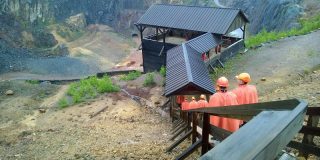Members of the Nordic network of researchers on vocational education and training (VET)* converged on the town of Falun June 7-9 for the NordYrk Conference. Mari Räkköläinen from the Finnish Education Evaluation Centre (Karvi) presented in her speech the ongoing reform of VET and evaluation of the quality of education in Finland. Her message can be summarized as follows: there are competing values and demands in the field of education and training, and we must find a reasonable compromise between them. We need, for example, local autonomy to carry out and develop education and training, but at the same time there must be enough supervision at the national level in order to maintain quality standards.
Virve Vainio from the Haaga-Helia University of Applied Sciences appeared before the workshop concerning the Finnish project JOPA. This project deals with the problem of how to pave the way for youngsters who are leaving comprehensive school and will enter secondary level vocational studies. It is financed by the Finnish Ministry of Culture and Education and aims at developing cooperation between comprehensive school and vocational institutions as well as enterprises in order to smooth the transition of youngsters into vocational studies and job.
The experiences gained from JOPA so far are encouraging. There were pupils who were not really inspired by working inside school but who got additional motivation through the out-of-the school modules. The periods they had on-the-job helped them in making their vocational choices and encouraged them to work harder on their comprehensive school studies. This means that it is possible to use an apprenticeships type approach already in the comprehensive school in the grades of 7.–9. The work done in the enterprise can be credited as part of their comprehensive school studies and also as part of a prospective vocational education curriculum. This requires common planning and realization from all parties involved – the school teachers, employer and the youngsters themselves.
This new way of carrying out curricula where comprehensive and vocational education and training schemes overlap and combine learning in the school and out-of-the school modules can help the youngster to manage in comprehensive school, bridge the gap between basic and secondary studies, give the vocational school and enterprises the opportunity for tailor-made recruiting and shorten the time needed to get qualifications and, thus, increases the pass rate in VET. All in all, beneficiaries are the youngsters, schools, employers and ultimately society.
The final discussion in the conference tackled the new paradigm of VET. It was concluded that we are now moving from a time based orientation to a competence based approach. It can be said that in Anglo-Saxon culture VET tends to be evaluated and organized very much from the perspective of enterprises, while in the German tradition it also involves a strong emphasis on education (Bildung). Now the question was raised whether there is common Nordic approach yet to VET? In order to deal with this interesting question, representatives from different countries have started to build a cross-country network. Perhaps, as a result of these initiatives, there will emerge study interests in this research area within the NordYrk network.

*Members of the Nordic network of researchers on vocational education and training (VET)
The network aims at strengthening research and cooperation between Nordic countries in the field of VET. This year there were attendees from Denmark, Norway, Sweden and Finland. The general theme of the conference was the current dynamics of teaching and tutoring. The presentations tackled problems such as the new skills needed by teachers in this changing world including digitalisation and the increasing amount of out-of-school learning. Finland‘s Åbo Akademi, Omnia vocational institute, and the Haaga-Helia University of Applied Sciences were represented. In addition Mari Räkköläinen from the Finnish Education Evaluation Centre (Karvi) was a key-note speaker.
The text was written by lecturer Virve Vainio from Haaga-Helia School of Vocational Teacher Education and education management professional Kari Viinisalo from Oppisopimuskummit ry.



